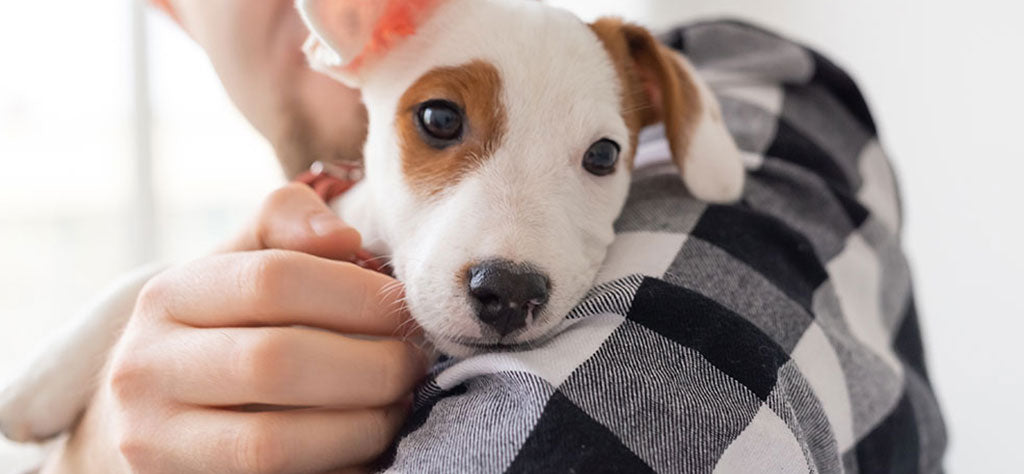How to encourage good behaviour in your puppy

So you’ve just got your first puppy, and you’re totally in love. Or perhaps the new puppy is an addition to an already growing dog family?
One of the most important things is to make sure the new addition to the family learns how to be well-behaved. Encouraging good behaviour in your puppy should start from an early age and it requires patience, consistency, positive reinforcement, and effective training techniques.
Here are some steps to help you encourage good behaviour in your puppy from the get-go.
Consistent training
We’re putting this one first, as consistency is often overlooked. It’s important that you are able to establish consistent rules and routines for your dog. Puppies thrive on routine, so having a consistent schedule for feeding, bathroom breaks, playtime, and training helps them understand what's expected of them.
Socialise your puppy
Once your puppy has had their necessary vaccines, try to expose your puppy to different environments, people, and other dogs. It’s wise to also take your puppy out and about to experience different situations from an early age. This helps them become well-adjusted and less likely to exhibit fearful or aggressive behaviour. Take a look at our blog on dog friendly meet ups in your area.
Teach them new tricks
Teach your puppy basic commands like "sit," "stay," "come," and "leave it." For example, why not practice leaving a treat on the floor, just in front of your puppy. Tell them to leave it until you give the command to take the treat. These commands not only make your puppy easier to manage but also provide mental stimulation.
Positive reinforcement
Who doesn’t like to be told or better, rewarded, when they’ve done something well? Reward your puppy's good behaviour and grasp of commands with treats, praise, and affection. Positive reinforcement helps your puppy associate good behaviour with positive outcomes, making them more likely to repeat those behaviours in the future.
Ignore unwanted behaviour
Sometimes, ignoring unwanted behaviour can be more effective than scolding. Puppies might engage in certain behaviours to get attention, and if you withhold that attention, they may stop the behaviour.
Some dogs develop habits and behaviours such as wanting to go in the garden every five minutes. If this happens, try to increase the period of time between letting your dog out, and get used to ignoring demands.
Redirect their attention
If your puppy is engaging in undesirable behaviour, redirect their attention to a more appropriate activity. For example, if they're chewing on furniture, give them a chew toy instead.
Crate training
Crate training can help with potty training and providing a safe space for your puppy. Make the crate a positive place by associating it with treats, toys, and calmness.
Potty training
Take your puppy outside frequently, especially after meals, playtime, and waking up. Try to give them rewards in the form of treats when they first start going outside. Remember to be patient during accidents indoors and avoid scolding as this has negative effects.
Exercise regularly
Puppies have a lot of energy, and regular exercise and playtime are important for their physical and mental well-being. A tired puppy is less likely to engage in destructive behaviour and also is more likely to want to eat their food.
Patience is key
Remember that puppies are learning, and it takes time for them to understand what you want from them. Avoid punishments or yelling, as these can lead to fear or anxiety.
Be social
Puppies are social animals, so spending quality time with them is essential. Bonding through play, petting, and gentle handling will strengthen your relationship. This is especially important if you have other puppies, or older dogs, and that you socialise with each in turn.
Get used to grooming
The local dog groomers is a great place to take your puppy once they’ve had their vaccinations. It’s a good idea to get them started early as possible when it comes to the basics, like brushing, teeth cleaning, and toenail clipping. Starting early and making that positive association will help your puppy relax in future.
Professionals can help
If you're struggling with specific behaviour issues or training challenges, consider seeking help from a professional dog trainer or behaviourist. They can provide personalized guidance based on your puppy's needs.
At Doggy Styling, we’ve got a specialised puppy introduction package to help your puppy get used to their first grooming experience. While it’s normal you’re your puppy might feel anxious, dogs are natural energy readers. Our groomers are trained to communicate through positive, confident energy.
Remember that consistency is key when it comes to training and encouraging good behaviour in your puppy. With time, patience, and positive reinforcement, you can help your puppy become a well-mannered and happy companion.
If you’d like to book your first, or your next, appointment with Doggy Styling visit us today at our Cobham dog grooming salon, our Weybridge dog grooming salon, or our Surbiton dog grooming salon.




Leave a comment